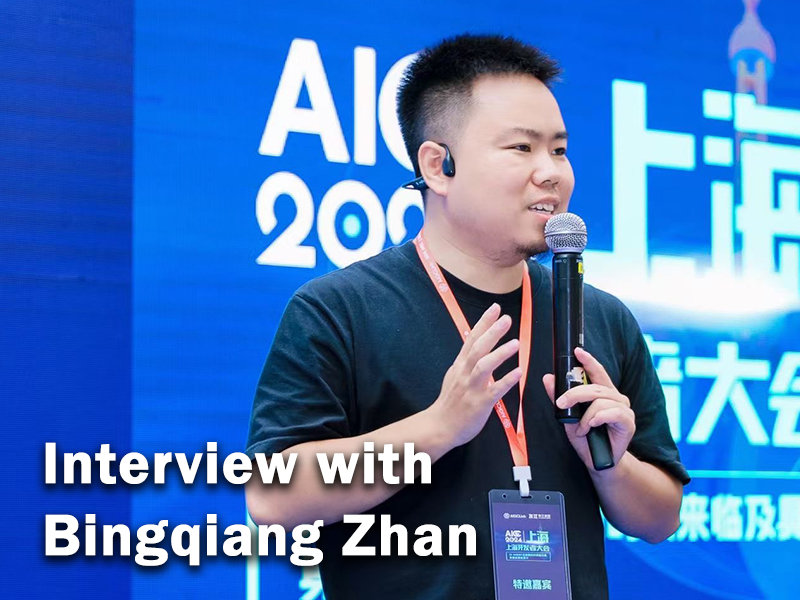- BTW’s exclusive interview with Mr. Bingqiang Zhan, founder of AIGCLINK, covered the purposes and innovations behind establishing AIGCLink, focusing on assisting AI super entities and the emergence of interconnected AI agents.
- This exclusive interview shows that he discussed the challenges in the AI industry, particularly in B2C and B2B sectors, and expressed optimism about the potential for growth in the blue-collar market by 2025, driven by advancements in embodied intelligence and multimodal technologies.
We are honored to invite Bingqiang Zhan, the founder of AIGCLink, for our exclusive interview in this AIGC event. He is not only a pioneer in the AIGC field, but also an outstanding Microsoft MVP. He will share with us the original intention of AIGCLink, the future development of AI agents, and the innovative breakthroughs in 2024.
Q: As the founder of AIGCLink, what was the purpose behind establishing it?
The initial purpose of founding AIGCLink was to assist the one million AI super entities that will emerge over the next decade. My background is in software development, and we have seen millions of developers and contract developers in China over the past few decades. After the release of chatgpt in 2022, I predict that there will be between one million to three million AI super entities in the next ten years. I hope to assist these entities in connecting with customer demands, providing inspiration for industry solutions, funding, and computational support to help AI be quickly applied and implemented across various industries in China. This was the initial purpose behind launching AIGCLink.
Also read: AIGC 2024 Shanghai Developers Conference highlights AI agent internet and embodied intelligence
Q: At this event, including the last AIGC event, I noticed you mentioned the concept of AI agents. What exactly is an AI agent, and why did AI agents emerge?
In the new era of AI, the smallest unit is an agent, and these agents can form AI teams that replace human teams in the real world.
Bingqiang Zhan, founder of AIGCLINK
My definition of an AI agent is that it uses SOPs (Standard Operating Procedures) in our human workflow to command large models to work. AI agent essentially replaces a person or a certain workflow. This was the initial driving force behind its creation—to replace people or workflows using intelligent methods. AI agents can replace roles like AI programmers, AI salespeople, or even AI boyfriends or girlfriends, fulfilling some of the functions of these roles.
Interconnected agents emerged because many big problems require teamwork, and interconnected agents link a large number of individual agents like AI programmers and AI sales into a team to solve larger problems. In the new era of AI, the smallest unit is an agent, and these agents can form AI teams that replace human teams in the real world.
Also read: AIGCLINK and future of automation: Bingqiang Zhan’s vision for AI agents by 2025
Q: What innovations or breakthroughs have you made in 2024?
I believe the biggest breakthrough this year in the large model field is Microsoft’s recent release of RAGFlow, which significantly enhanced the recall and accuracy rates of large models used in knowledge bases and other fields. Previously, large models combined with vector databases could only achieve 70% accuracy, but RAGFlow has helped bridge the gap to 90% accuracy required for commercial scenarios.
Another significant breakthrough is the explosion of embodied intelligence due to the maturity of multimodal technologies. This explosion could lead to a situation where, in two years, we might see a large number of embodied intelligence applications entering the real world and replacing some white-collar jobs.
Q: Have you faced any difficulties this year in the AI field?
Yes, there are difficulties, mainly on two levels. The first is B2C. The biggest problem now is the issue of registration, which typically takes three to six months in China. This period is too long for many startups, which might need to achieve a market PMF (Product-Market Fit) in three months. Another issue is fierce market competition, where a small company might develop an application only to have a large company copy it immediately.
The second difficulty is in specific application scenarios, especially B2B. There’s a technological divide between domestic and international models, and due to the environment in China, foreign models can’t be used directly. This suppresses the application in many scenarios, although domestic models are catching up.
Q: You mentioned a vision for the future. Do you have any plans or visions for the industry in 2025?
As multimodality and embodied intelligence continue to develop, we will see an explosion in this market.
Bingqiang Zhan, founder of AIGCLINK
I think the biggest market opportunity in 2025 should be the incremental market. Currently, large model applications are mostly replacing white-collar jobs, which is still a zero-sum game focused on ROI and cost reduction. However, the blue-collar market, where robot replacement scenarios are still limited, is a huge incremental market.
As multimodality and embodied intelligence continue to develop, we will see an explosion in this market. For instance, if every household has a robot or every factory has industrial quality inspection robots, it is a massive market opportunity. I am very optimistic about the blue-collar replacement scenario in the next two years, as it is largely undeveloped and has a lot of potential factors.
A personal insight
In BTW’s exclusive interview with Bingqiang Zhan, founder of AIGCLink, I gained a deeper understanding of how personal vision can drive industry-wide change. His passion for empowering AI super entities to transform various sectors in China resonated with me, highlighting that true innovation goes beyond technological advancements. His commitment to using AI to replace not just jobs but entire workflows, while also fostering interconnected teams of AI agents, reflects a personal insight I have long believed: that technology’s greatest potential is in its ability to amplify human ambition and reshape the future.

